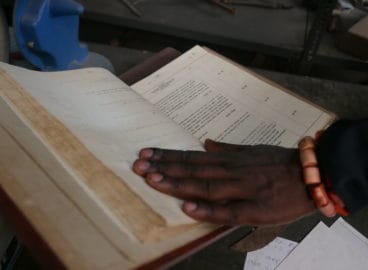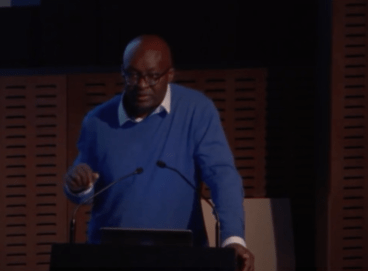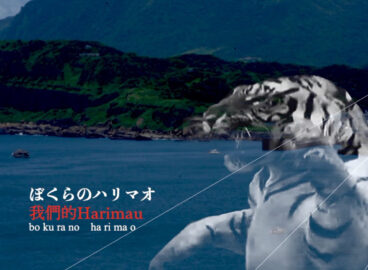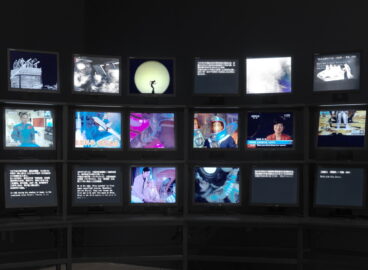This conversation took place via email from December 2020 to February 2021. Though participants had already been acquainted for a long time before this, they began their exchange with casual personal introductions. This dialogue contributes to ongoing research and discussions about models of cultural work in Southeast Asia.
Dina: Hi, Bing, and all, thanks for kick-starting this process. It is always good to start the year with collective thinking and reflection. My name is Syafiatudina, or Dina for short. I work as a translator, organizer, and curator in Yogyakarta. I became part of KUNCI in 2009. I have been keeping myself and others busy thinking about institutional practices, social movements, collectivity, and critical pedagogy. I am also finishing my studies in the MA Curatorial Practice program at the University of Bergen with a project and thesis on listening as a political act and the intersection between curatorial and organizing practices. I love cats, dogs, and fashion. I do karaoke by myself regularly to create a space for doing and thinking otherwise.
Ferdi: My name is Ferdi. I dabble in different types of work, mainly in the cultural field, including teaching, writing, giving workshops, researching, and translating—sometimes doing some of them at the same time in order to get by. My top two favorite things to do are sleep and procrastinate. I also deeply enjoy cooking, though I’m not the best of cooks. What gets me going is thinking and doing things together with others, although I am usually the first to be wrecked when this collective mode of working breaks down. My primal astrology animal is a kangaroo, and my spirit animal is a horse. I like the second one better.
Nuning: My name is Nuraini Juliastuti, or Nuning for short. I am a writer and researcher, mainly around arts organization, activism, illegality, and alternative cultural production. Apart from deeply hanging out intellectually and non-intellectually with my KUNCI fellows, my husband and I run Reading Sideways Press, which is a small press we developed to publish works and translations on arts, sports, and literature. In 2020, I joined Amsterdam School of Cultural Analysis and began work on a postdoctoral fellowship titled “Worlding Public Cultures: The Arts and Social Innovation.” Writing is the main outcome of my practice, though thinking with clarity feels like a challenge at times. Writing satisfies my personal urges to theorize about things and events that have shaped me. These range from big things to small things—such as drawing and baking with my daughter, to looking at flowers on the street. Looking forward to the conversation!
Bing: Hi everyone! I’m Bing. I think laughing and eating well are of utmost importance. I like to write, read, and have engaging conversations. I appreciate honesty and idiosyncrasy, and am eternally devoted to fashion and K-pop. My practice facilitates creative assemblages of art, writing, ideas, and contexts. Currently, this takes the form of publications and programs.
I think a good place to start this conversation is with the School of Improper Education (SoIE), which KUNCI founded in 2016. The school’s open call states that “the meaning of authority in knowledge production will be scrutinized.” Learning (and more importantly unlearning) is done collectively and without predetermined outcomes like a grade, ranking, or certificate. In SoIE, a teacher becomes a student, and vice versa. Effort is made to do away with the presumed hierarchy or superiority of any particular figure or subject matter. This led me to think of [Jacques] Rancière (a significant reference point for all of us here), who once said that one should never “presuppose the imbecility of the viewer.”1Fulvia Carnevale and John Kelsey, “Art of the Possible: Fulvia Carnevale and John Kelsey in Conversation with Jacques Rancière,” Artforum 45, no. 7 (March 2007): 258. SoIE is, therefore, in my understanding, characterized by contingency and embodied process. I understand, for example, that in the past, you’ve learned sign language together. What are some interesting “classes” that you’ve taken part in over the years? Have there been moments when there was a breakdown or dispute in the communication/transmission of knowledge, and what did you learn from that experience?
Dina: I have been thinking more and more about the School of Improper Education, especially since the pandemic started, and I get more energized whenever I remember interesting SoIE “classes” or moments—for example, our very first meetings, when we arrived at the decision to learn sign language. One of these lasted for three hours, although initially we agreed to finish in one and a half or two hours. I remember that we started from the shared position of not knowing. Not knowing what we can do together. Not knowing what each person wants from school and beyond. But we kept talking and listening to each other. We wrote a lot down on Post-it notes. We insisted on making connections between words, concepts, and people. Finally, we collectively decided to learn sign language. It felt great. It felt like we were operating as one big, collective brain.
Here is my note from that meeting, but unfortunately it’s in Bahasa Indonesia.
Maybe other people have different memories of interesting SoIE classes or moments? Regarding moments of breakdown, maybe it’s more about moments of breaking down. Like what we are experiencing now during the pandemic. I feel like the physical distancing made it difficult for the school to operate, because we relied a lot on gathering and doing things together in the same place at the same time. Perhaps we need to figure out how to better use the digital space for this purpose? Maybe. But personally, I often feel screen fatigue from working too much on the computer.
Ferdi: I have difficulty responding to the question, as I haven’t been there myself when this has happened (or, actually, since the school was founded). So I can only share my impressions of things that I saw unfolding, through the many traces of the school on our blog and via other means of publication, and our conversations on WhatsApp and video calls. I remember that in the beginning, the atmosphere was kind of “sticky” with apprehension. A weird thing to say considering that all of this, for me, was experienced virtually—rather than physically in terms of sharing the space with others in Yogyakarta. I think this was because the idea of “not knowing” also applied to us as the school’s organizers. Despite the fact that we had already read Rancière’s text, we did not feel more prepared per se. Not only were we not quite sure how to hold space for the students to explore “not-knowingness,” we did not necessarily know how to respond to the simplest questions—such as, “What is it that we are trying to do?” This is not to say that we did nothing when faced with this difficult question. As Dina already explained, the collective decision to learn sign language shows our generosity toward each other. It was a way of relinquishing the power of knowledge from its holder. We realized that no one was in the know, and tried to hold onto that feeling and continue together.
I guess the moments of breakdown are interwoven through all of this: the excitement when things finally seemed to be going somewhere; the disappointment upon realizing that this “somewhere” was not really “anywhere” (what is it about knowledge that is so territorial?); the tenacity of holding onto speculation and attending to uncertainties as modes of studying; the relief that while things continued to simmer, they never ended up spilling over.
Mind you, this was in the very early stages of the school. There is a stark contrast to what came up later on, when existing power structures (privilege and lack of privilege) emerged as a springboard in our thinking about how and what knowledge can be produced. Not knowing and the accompanying tensions seem to lose their urgency when we turn the school inside out and look toward working with communities.
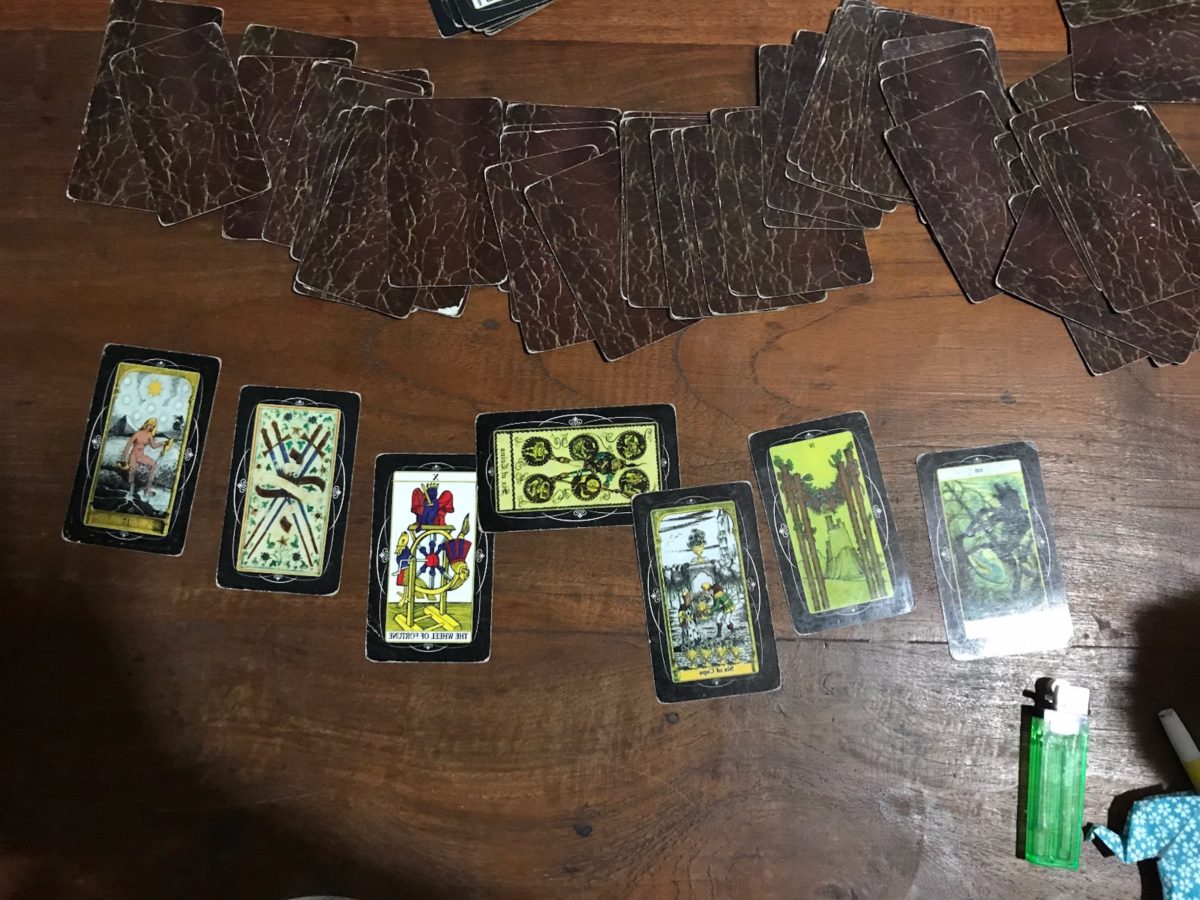
Nuning: I always need to remind myself that the idea of the school emerged from our wholehearted intention to navigate the unknown areas and feelings that we experienced nineteen years after KUNCI was born, and twenty years after Reformasi. Embracing the unknown has been key to our work since the beginning. In light of this, learning sign language—in conjunction with reading Rancière’s text on [Joseph] Jacotot—seemed very apt. Apart from the idea of speculating regarding the uncertainties that Ferdi mentioned, there is also humility and resilience in our invitation to take up uncertainties, and maximize them as avenues to keep on moving and living. My personal reflection on the school also points to another matter: KUNCI’s habit, or tactical device, of nurturing space for experimentation. In our recent collaborative writing for Ugly Duckling Presse’s pamphlet series, we likened the idea of the school to slowness, but it’s the kind of slowness that is infused with an atmosphere of “radical patience.” Since 1999, we have changed how we describe ourselves at least three times. In the latest rendition, the concept of “vernacular education” is transformed into “collectivizing study.” Our main idea remains that we are always driven to deflate education and eschew the professionalization of intellectual thought.
When I read the many notes, essays, and poems written by the school’s participants, in preparation to write an introduction for the school report book (published by KUNCI in 2019), I got the impression that learning sign language was like a shock device. In the participants’ attempts to embrace the invitation to engage with uncertainties (through joining the school), learning sign language created productive opportunities to articulate what uncertainty means and to explore the usefulness of having such a “blurry” space as the School of Improper Education. Like Ferdi, I am also part of KUNCI’s diaspora, forced to disengage from physical presence as the main medium for communication. I do not take for granted the opportunity to write an essay reflecting on other people’s reflections about the school.
I think an interesting phase of the school was when we practiced the “Turba” (Turun ke Bawah) method.2“Turba,” an abbreviation of “Turun ke Bawah” (get down to the grass roots), is a working method devised by the Institute of People’s Culture (otherwise known as LEKRA, or Lembaga Kebudayaan Rakyat) in the 1950s and 1960s. The method embodies the institute’s principle that to work with and through the arts means to work with the people. We incorporated Turba, in particular, as one of the methods at SoIE to help us think about how to study together with local communities. In case you think it’s useful, the full PDF of the book can be downloaded here. (The book is in Bahasa Indonesia.) My observation, based on the participants’ notes, was that the Turba method provided an opportunity to reflect on what “under” means in relation to studying practices. Turba emerged as a kind of visitation mode, which led to learning about diverse ways of living in unfamiliar contexts. It pointed to the meaning of “community” (always a valuable concept) and the possibility of a new way of living.
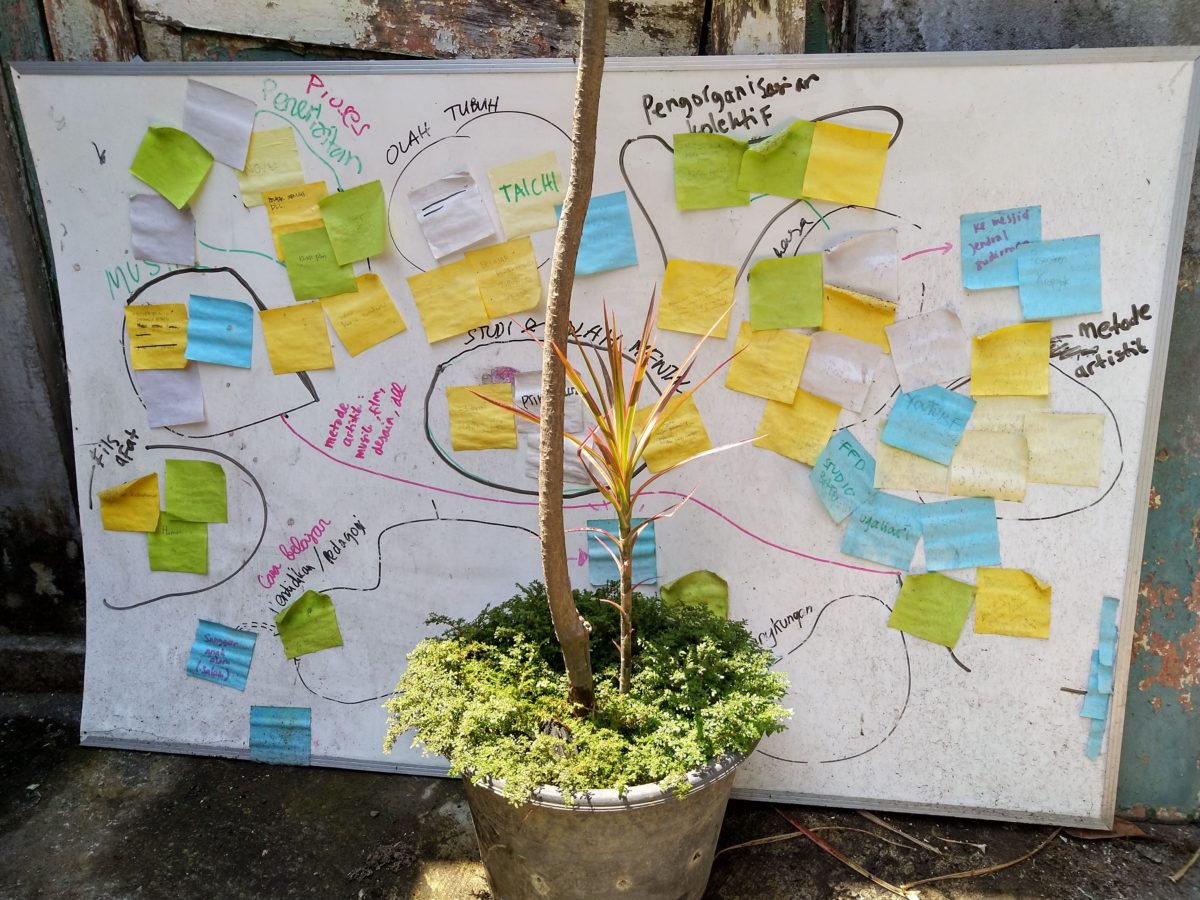
Bing: In your responses, you’ve touched on ideas and practices that are central to KUNCI: togetherness, community, and collectivity. I recall reading a published conversation between members of KUNCI, The Showroom (London), and Casco (Utrecht) about the informal, affective, and intangible notions of KUNCI’s collective organization—such as friendship, hanging out, porous involvement/membership, and the necessity of domestic work like buying toilet paper (which the text was titled after!).3Antariksa, Syafiatudina, Ferdiansyah Thajib, Emily Pethick, and Binna Choi, “Toilet (T)issues #1: Toilet Tissue and Other Formless Organizational Matters,” in Unlearning Exercises, Art Organizations as Sites for Unlearning, edited by Binna Choi, Annette Krauss, and Yolande van der Heide (Amsterdam: Valiz, [2018]). What do you think is unique or particular about KUNCI’s collectivity in Yogyakarta, or even Indonesia, and how does this translate (or not) to other international contexts? (For example, in KUNCI’s recent projects abroad in Hong Kong or Kampala)
Ferdi: Another good question that is not so easy to answer. It’s hard for me to articulate this “uniqueness” because 1) I am too deep in the experience, making it quite hard to put it into words, and 2) I don’t know how to say it without sounding too full of myself. Maybe I can highlight one particular moment. It was during our twentieth anniversary in August 2019. We had a bit of a party, or selametan in the Javanese tradition, where we invited close friends and community members for a meal and celebration. The theme of that event was 20 tahun KUNCI: Sama-sama belajar, belajar sama sama (a play on words that roughly translates as “20 years of KUNCI: Together studying, studying together”).
There was a brief moment before dinner when we invited all of the guests to form a big circle in our yard and to share their impressions or reflect together with us about the years that have passed. One of our new members, Rifky Akbar Pratama, or AP, gave a short speech about how he felt being the “fresh blood” in the collective. I was so astounded by the speech, I asked him to send the script to the rest of us. Entitled “As Far as I Know,” it conjured a poignant image of what our collective can become. I quote a part of it here (with the hope that my English translation will do justice to the original text’s poetics):
“I chose authenticity of experience as a key term, because as far as I know, that’s what sets KUNCI apart from other organizations. Something that, as far as I can tell, makes comparisons unreliable. After all, can’t idiosyncrasy or uniqueness only be measured against itself? As far as I know, the authenticity of experience is very close to the term rasa (feelings)—something that is easier to practice than to theorize about. It opens up the possibility for us to ask, “Is it possible to use feelings as the starting point for knowledge?” It opens up the possibility to pause, and to not rush toward rationalization. As far as I know, folks who are so afraid to show such feelings and raw emotions often hide behind intellectualization—or “defense mechanisms,” as they are called in psychology. These people have difficulty accepting openness, vulnerability, and also love, because they are too dependent on their head’s contents. As far as I know, KUNCI’s not like that. As far as I know, it is open and not forceful, and yet it is faithful to keeping secrets. It opens its hands to my generation, which tends to avoid fixation on the greatness of the past and refuses to bear shame for past failures. KUNCI, as far as I know, makes manifest Uncle Mao’s teaching, “A master who is too strict has no disciples; water which is too pure has no fish.”
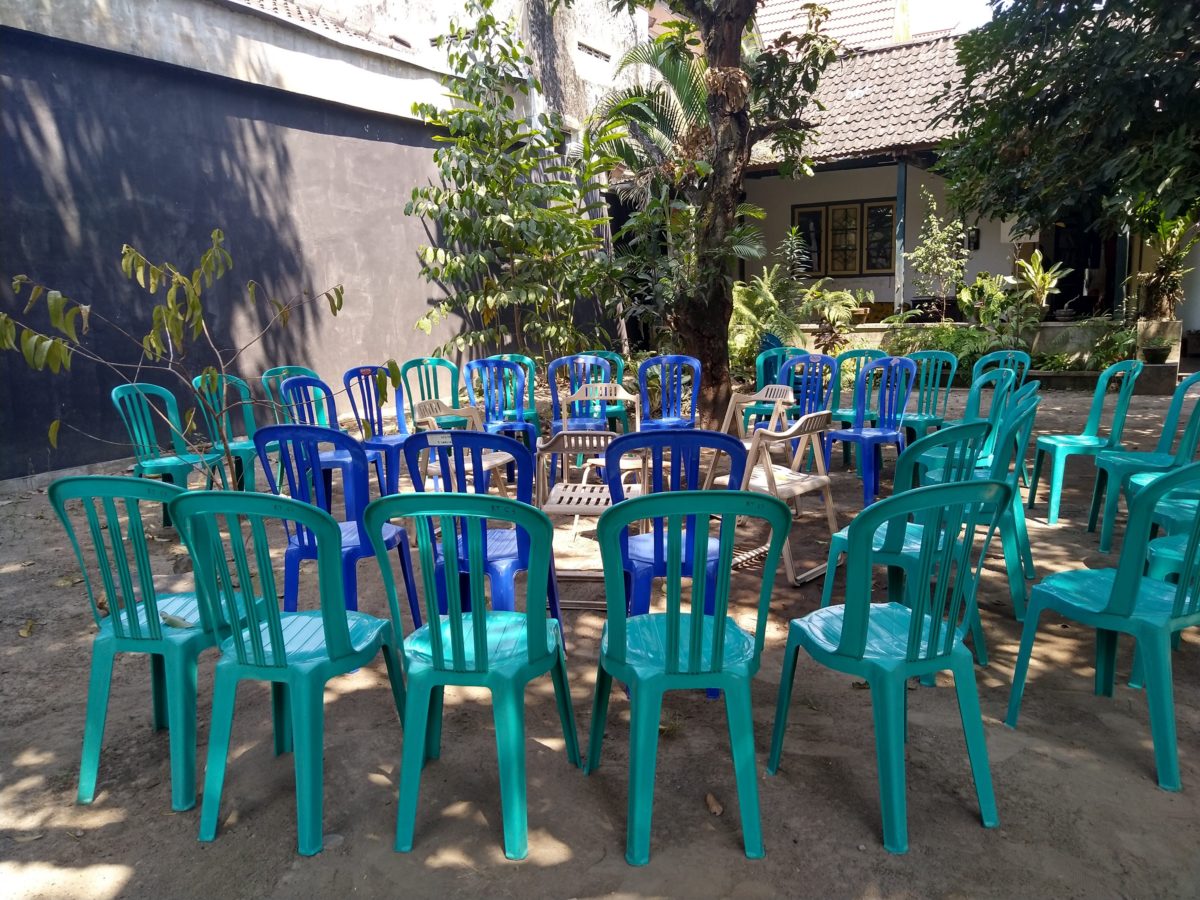
Nuning: The question about uniqueness always forces us to think about what shapes us from the inside as well as from the outside. In the beginning, KUNCI was established as a space for cultural studies. We realized that what we are actually doing is escaping from the limitations and prior understandings of what “cultural studies” means. We appropriate the established meaning of cultural studies, and at the same time, seek to build our own ways to be “amateur intellectuals” (as Edward Said posited in Representations of the Intellectual, 1996).4Edward W. Said, Representations of the Intellectual: The 1993 Reith Lectures (New York: Vintage Books, 1996). By “amateur intellectuals,” I mean we move freely in and out of formal institutions. This flexible positionality gives us a certain kind of freedom to avoid fixations (back to AP’s poem, which Ferdi mentioned) and, in our case, to avoid professionalization. We don’t want to specialize in a certain field; rather, we want to have faith in what we deem valuable.
Bing: I really appreciate KUNCI’s epistemic humility and sensitivity. To pick up on the point about “fresh blood,” how has it been to organize and think together with the younger generation? And as a somewhat paradoxical follow-up question to my earlier query on particularity, are there any projects, collectives, artists (in any field) you feel resonate with KUNCI?
Dina: I think humility is an important idea to raise here. Humility is an important position that we take when we work with and relate to others. Regardless of organizational age (who has been with the organization since the beginning, middle, or more recently), everyone arrives with their own experience and expertise. So it’s important to listen and “walk together.” This comes from the Zapatista principle of preguntando caminamos, or “walking as we ask questions.”
It’s important to always have assumptions checked, and to have intentions shared and clarified. Can the collective support each member’s personal quest in life and practice? In what ways do we not provide this support, and therefore need to respect each other’s personal space? This process requires a lot of conversation, and as a collective with members from different walks of life, places, and even time zones, sometimes we feel out of touch with others. But that’s also okay because there is an implicit trust that we can always talk whenever it is needed. Although this trust needs to be maintained too.
With regards to generational difference, there were some discussions that emerged (in KUNCI and other forums) on how certain issues, such as precariousness, privilege, or mental health, are more actively raised by the younger generation. Rather than pegging these issues as the concerns of one age group, I guess it is more fruitful to use them as an entry point to comparing material conditions in different time periods, and to see what has changed and what remains. So intergenerational dialogue needs to be maintained in order to study forms of togetherness together.
On projects, collectives, and artists that I feel have resonated with KUNCI—actually, there are a lot. Partly because I feel that, in KUNCI, we want to nurture relations. The framework of being a “vanguard,” which I find a lot in the arts, is dangerous. I feel that we are indebted to the people who came before us, who are here with us now, and who are yet to come. Being in the Arts Collaboratory network has put us in touch with groups of shared affinity. I learn from groups who also do collective study, such as Read-in, or self-publishing initiatives like Taller Producción Editorial, Display Distribute, Kerjasama59, Zine-ah!, and libraries like C20 library & collabtive, Kineruku. Another organization that resonates with KUNCI is dislocate. These groups and initiatives have shown how collective publishing, studying, and organizing are entangled while constantly having various feet (not just two) in different disciplines and sociopolitical movements. I think there are many unnamed communities with important practices that resonate with ours, like reading circles among workers (including migrant workers in Taipei and Hong Kong), groups who are fighting for their land rights and rights to live, student presses, and many more. If I list all of them, this text will look like a shout-out section in an album. 😀
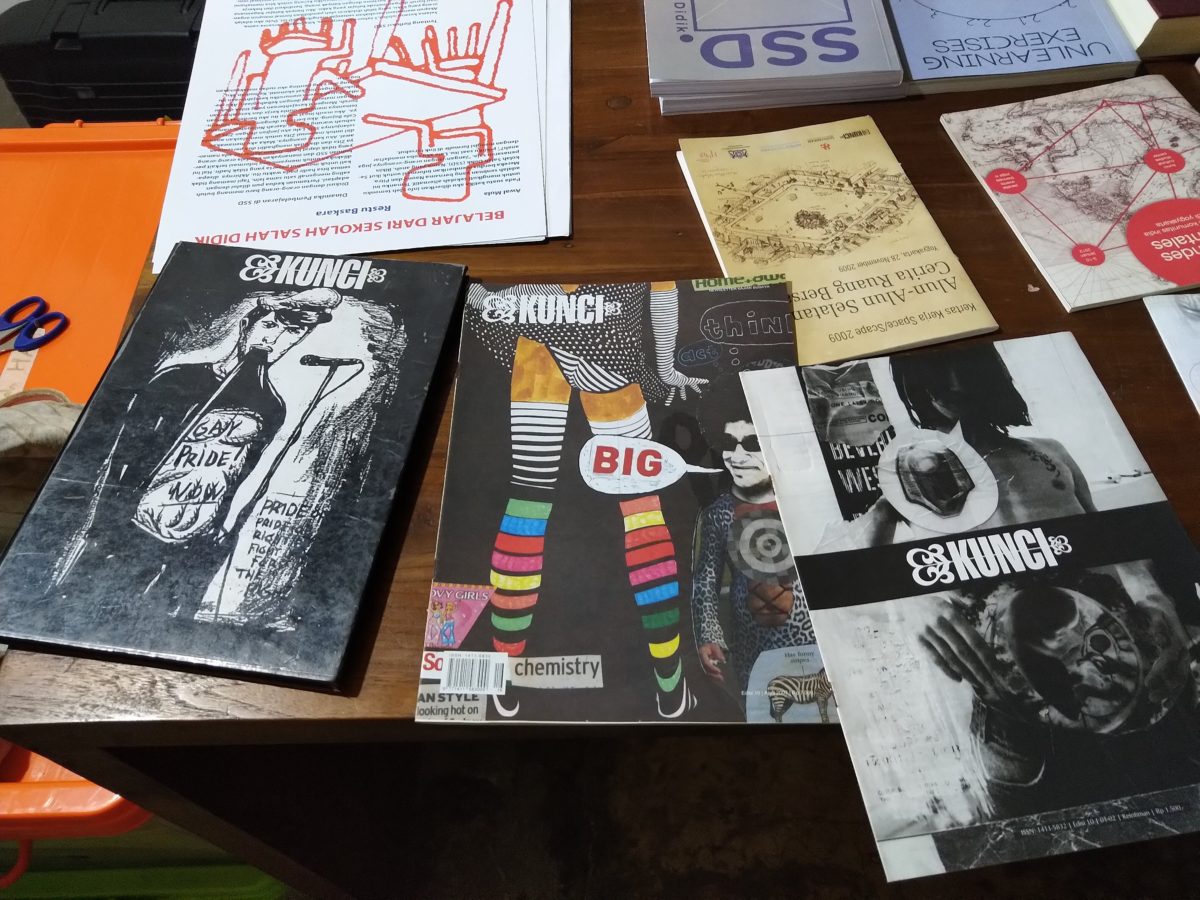
Ferdi: There are also a lot of groups, artists collectives, and organizations around the world that have initiated school(-ish) initiatives that I find fascinating, like Ahmet Öğüt’s The Silent University, Al Maeishah, which is an itinerant communal-learning platform, and Gudskul, which is co-initiated by ruangrupa in Jakarta. There are also those I see as our epistemic allies, such as Crater Invertido in Mexico City and Casco Art Institute in Utrecht. Long-term collaborations by the likes of Stefano Harney and Fred Moten and Raqs Media Collective, 16 Beaver group artist-run initiative in New York, and the bygone Dutch queer collective Strange Fruit have also become sources of inspiration.
With regards to generational differences, I think it is an important (tacit) policy of ours not to shove them under the proverbial carpet. As a matter of fact, this also applies to other differences based on gender, sexual orientation, religion, class, ethnicity, race, and ability. I think we try to constantly engage with these issues through what Denise Ferreira da Silva terms “difference without separability,”5Denise Ferreira da Silva, “On Difference Without Separability,” in Incerteza Viva: 32nd Bienal de São Paulo, eds. Jochen Volz and Júlia Rebouças, exh. cat. (São Paulo: Fundação Bienal de São Paulo, [2016]), 57–65. that is, a sociality, or mode of coexistence that moves away from the grip of Cartesian determinacy. It invites us to think through what brings us together and what can we do with these diverse (be-)longings, while at the same time acknowledging that what sets us apart never fully defines who each of us is.
This proposition also helps us to think in terms of the time that we have together now as all of the time any of us has left. This may differ according to the different chronological age of each KUNCI member. But this notion of ongoing urgency has helped us in turning our past personal baggage (achievements and failures as AP described it in his poetic speech, and I would add, joy and trauma), present struggles, and future uncertainties into a means of intimating collective well-being.
Bing: The idea of epistemological humility has recurred in our conversation. At this point, I think it is important to note that KUNCI does not fetishize the nostalgia of openness, but rather addresses the particular conditions and difficulties of interpersonal relations. In our ongoing experience of the pandemic, the language of “care,” “intimacy,” and “solidarity” has been mobilized, for better or worse, with increasing frequency. It is also interesting to see who is now taking up that type of discourse—but that is another matter. What is your view on a mode of “collectivity,” or “being together,” that might have an inconsistent application in real life? How might one check the privilege of rhetoric?
Nuning: I am growing older with KUNCI, bringing along all my moments of happiness, disappointment, anger, anxiety, and desperation, all the while holding onto hope. Among ourselves, there have been many discussions where we try to define what it means to be together as KUNCI. I like to think about a collectivity that has different shapes—that of friendship, a dysfunctional family, a gang, or maybe even a patch of wild grass. Why are we together? The answers can be so diverse: to expand the scope of our intellectual camaraderie, to be the intellectual and trivial salient support system, to nurture my/our sense of disobedience in times of uncertainty. “Growing older with” can be used as a perspective to view the politics of generational relations in the organization. “Fresh blood” is not just the younger generation, but allies, and friends who I actively look out for. It allows me to regard KUNCI as a lived/embodied experience that is open as a site to theorize or to make abstraction from personal experience. I think the inconsistent applications of “collectivity” and “being together” might happen when an individual/organization using these concepts can’t answer why and how they would use them. Being honest and genuine is the key to knowledge. If we can do that, we can be abstract and concrete at the same time. It takes practice to be able to do that—a certain kind of practice where we need to persevere in the face of temptation from various acts of validation. Collectivity is collectivity, being together is being together. But we need to remember that neither can be easily formalized. They can also mean and be known as different things altogether.
Dina and Ferdi already mentioned a number of independent organizations that I also like. Recently I have been observing the works of The Black School (New York), The Feminist Memory Project by Nepal Picture Library (Kathmandu), Pathshala South Asian Media Institute (Dhaka). I also like following the works of Warriors of the Aboriginal Resistance and Aboriginal Tent Embassy.
I feel that your previous question about “working and thinking together with the younger generation” closely relates to the next question about the discourse and application of “collectivity” and “being together.” It makes me think about the history of youth in Indonesia, and how it always follows the generational timeline. Each generation is imagined to contribute something to that history. The members of KUNCI have their own needs, and these needs serve as a guide to our future. As we are becoming together, we learn that these needs are rooted in our histories. This should be emphasized because we might not get this character in other modes of collectivity. On the other hand, it is dangerous to frame everything in terms of “collectivity” and “being together.” We don’t need to wait until certain concepts or categorizations pop up to define what we feel or think about ourselves. Instead, I’d like to propose apprehension as a tool to check the privilege of one’s rhetoric. We are rich enough with histories to produce our own keywords, words that enable us to critically review our condition.
Ferdi: I hope that what we have been telling you so far about being together, collectivity, etc. does not come across as too fuzzy-wuzzy, because these ideas are not only crafted through time and labor but also built upon tensions and conflict. I often think about what terms and discourse have been left untouched by colonial, patriarchal, and capitalist structures. The limits of this rhetoric lie in the experience: while somehow throughout the years we have been able to hone the capacity to red-flag hogwash, often we don’t allow this intuition to stop us from saying yes, for example, to an invitation to collaborate (though it also really depends if we have the energy to do so or not). I am thinking now about hospitality as a form of hospice-ing, about engaging with unethical and unsustainable practices (what you call “rhetorical”?) toward enabling the dissolution of these very practices.
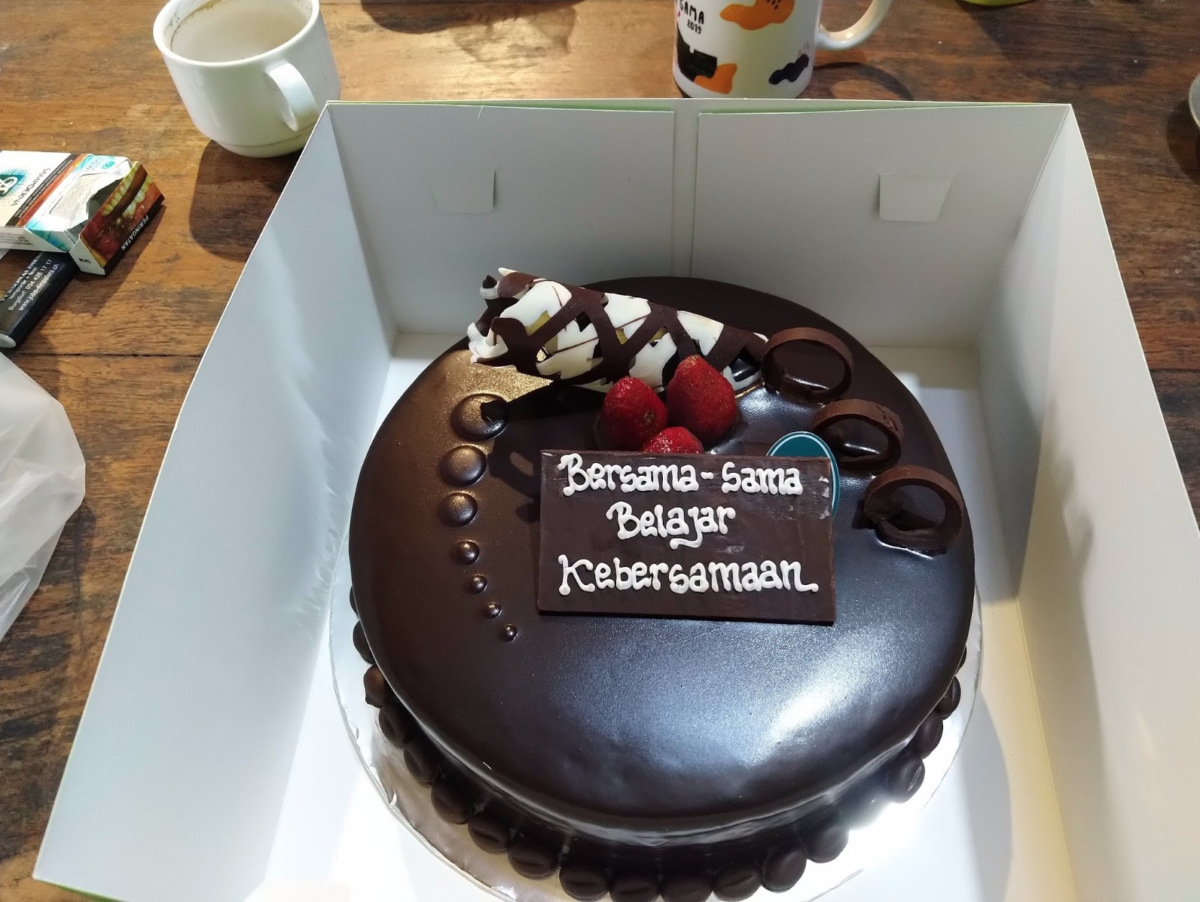
Bing: What a beautiful cake! I was planning on visiting Jogja for KUNCI’s 20th anniversary after Ferdi mentioned it to me, but sadly the timing didn’t work out. 🙁
I don’t think KUNCI is “fuzzy-wuzzy” at all, or if it is, only in the best possible way! I appreciate your mentions of “apprehension” and “hospice-ing,” because I think they underscore KUNCI’s willingness to go through the process of collaboration, and emerge with an understanding of the difficulties, insecurities, and complicit actions that possibly come along with that collaboration. The suggestion (from Nuning, Gita, and Dina) to have a conversation rather than do an interview for post already speaks to KUNCI’s admirable self-reflexivity in that regard.
This might be a sudden pivot, but your most recent set of responses makes me think of the time when someone told me that a job interview and a date are totally different and cannot be compared. I would beg to differ. I feel like all work, especially cultural work, is about personal appraisal. Or, put otherwise, being a blank canvas or an empty vessel are luxuries that not everyone can afford. Yes, working or being together can build trust and political solidarity, but the intimacy of that process can also be leveraged and manipulated to nefarious ends. I don’t mean to sound morbid—only respectful of the resilience and time it takes to develop a fortified practice like KUNCI’s!
Nuning: We had a two-day meeting (deep hanging-out sessions) last week to talk about what we should do next. On the first day, we divided ourselves into four groups of three to four persons each. In these “triangle” and “square” meetings, each of us talked about our struggles with matters of personal importance. Dina, AP, and I were in the same group. The need to do something together is as real as the need to be left alone and have personal, autonomous space. I noted down the following sentences:
- “KUNCI, which serves as the anchor and the room to play”
- “the need for activities that function both as a playground and space of companionship”
- “The need for articulation and documentation/documenting ourselves”
- “resonansi metode,” or methods that resonate (with others)
- publishing as a friend
- grounded intellectuals/tentacular scholars (scholars with many footings), and
- cross-territories translation.
There was also a conversation about the (collective) ghost of the present and the future, which emerges in the form of family and personal struggles. At the end of Day 2, we spent time thinking through keywords/findings generated in Day 1. We came up with a clearer way to think about KUNCI/ourselves through the words “Study” and “Forum” attached in our current definition. Studying and collective tooling emerged as two layers of our intellectual collective works. I feel like I am not really providing a final comment here. 🙂 I am only presenting the main takeaway, or what really stays with me after the KUNCI meeting. I thought that this resonated with our current conversation.
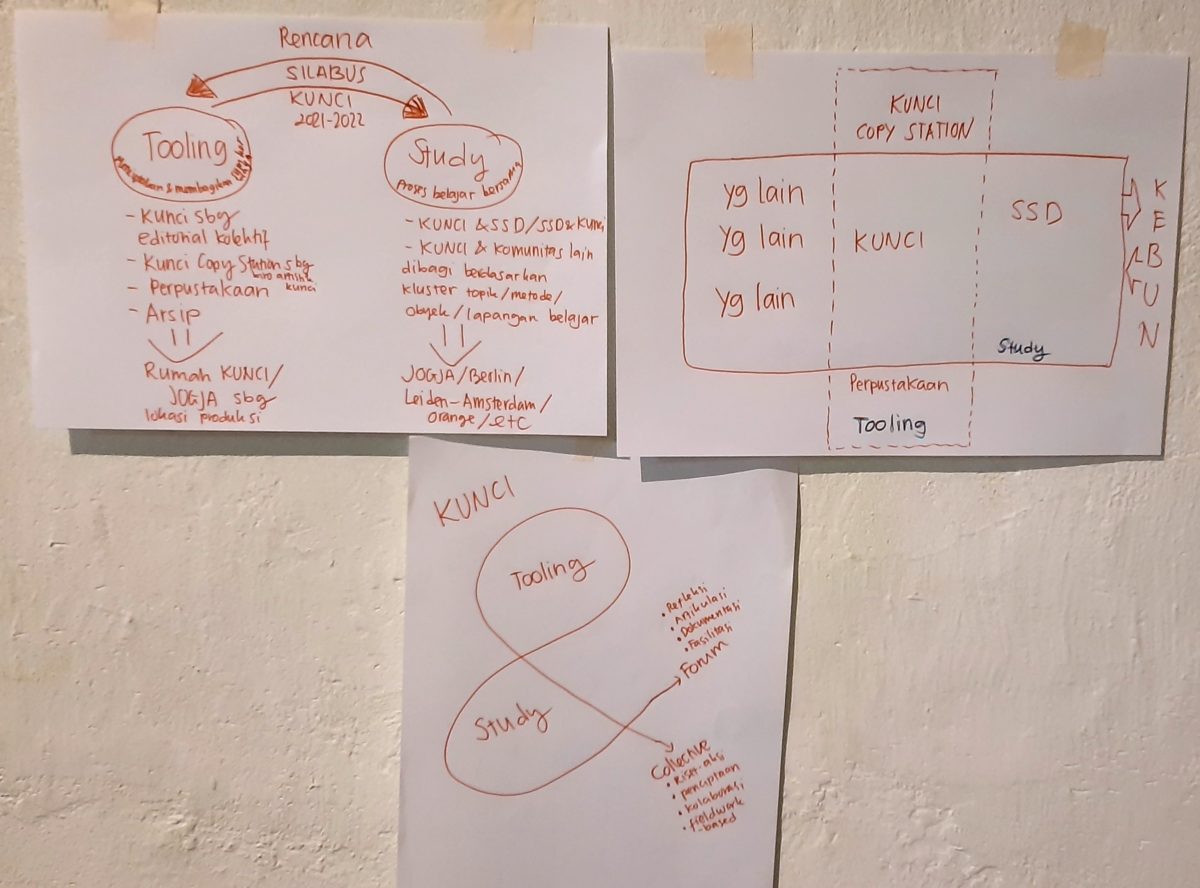
Ferdi: I just want to say how I always appreciate having these conversational moments with friends like you, Bing. While articulating, naming, and defining our experiences and practices as a collective is not easy to do, being in conversation with folks like you and others who do not just bombard us with ready-made questions, but rather really listen and make use of these moments as a means to build knowledge together, is precious. Personally, every time this kind of conversation takes place, it’s compelling to see how past understandings and ongoing events gain new meanings through different encounters and forms of interlocutions. Sharing a story becomes an event in itself, and experiences are not just being conveyed and represented but also created. Speaking with the collective “hat” back on, for us, a conversation such as this one is an important tool in reconfiguring ourselves, again and again.
Dina: To me, this deep conversation serves as a reminder of why we are here today, and it invokes a nostalgia for things that are not yet here but perhaps already there in the future. I am grateful to share it with Ferdi, Nuning, and you, Bing. Actually, while we were editing this text (up to March 2021), we were still in the middle of our annual meeting to talk about what should be done next—referring to Nuning’s notes of reflection above. In other organizations, annual meetings like this are usually held at the beginning of the year. After having five “annual” meetings this year alone, I made a joke that KUNCI’s so-called annual meeting might last for the rest of the year! The joke is funnier in Bahasa Indonesia. But I share it here anyway to show our endurance, persistence, and apprehension while dealing with complexity. I hope that the others who read this will find their strengths too.
- 1Fulvia Carnevale and John Kelsey, “Art of the Possible: Fulvia Carnevale and John Kelsey in Conversation with Jacques Rancière,” Artforum 45, no. 7 (March 2007): 258.
- 2“Turba,” an abbreviation of “Turun ke Bawah” (get down to the grass roots), is a working method devised by the Institute of People’s Culture (otherwise known as LEKRA, or Lembaga Kebudayaan Rakyat) in the 1950s and 1960s. The method embodies the institute’s principle that to work with and through the arts means to work with the people. We incorporated Turba, in particular, as one of the methods at SoIE to help us think about how to study together with local communities. In case you think it’s useful, the full PDF of the book can be downloaded here. (The book is in Bahasa Indonesia.)
- 3Antariksa, Syafiatudina, Ferdiansyah Thajib, Emily Pethick, and Binna Choi, “Toilet (T)issues #1: Toilet Tissue and Other Formless Organizational Matters,” in Unlearning Exercises, Art Organizations as Sites for Unlearning, edited by Binna Choi, Annette Krauss, and Yolande van der Heide (Amsterdam: Valiz, [2018]).
- 4Edward W. Said, Representations of the Intellectual: The 1993 Reith Lectures (New York: Vintage Books, 1996).
- 5Denise Ferreira da Silva, “On Difference Without Separability,” in Incerteza Viva: 32nd Bienal de São Paulo, eds. Jochen Volz and Júlia Rebouças, exh. cat. (São Paulo: Fundação Bienal de São Paulo, [2016]), 57–65.
